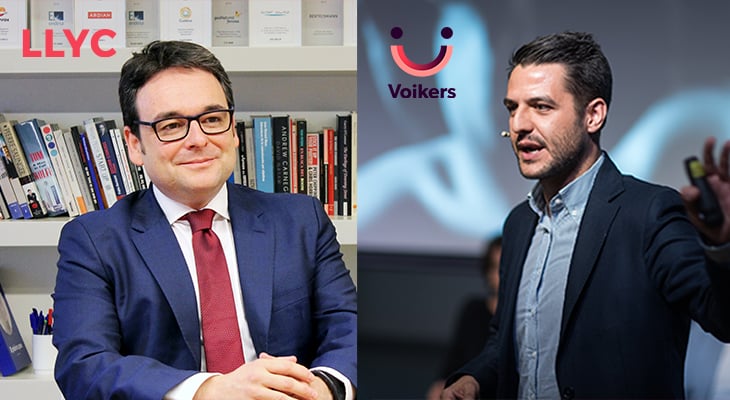
The disruption from COVID-19 has compounded a work agenda that has, until now, been marked by the encroaching envelopment of Artificial Intelligence and automation. This pandemic represents a clear “before” and “after” in company-employee relationships. Now, companies must reinvent themselves to manage talent.
LLYC’s recent Talent Trends 2021 report identifies three major lines of transformation for 2021. The first was already upon us due to digitalization, but it has been further accelerated. It relates to the need to prioritize upskilling and reskilling among employees, whether to create a competitive edge in the market, respond to the prospect of longer careers, or provide managers with a series of leadership tools that were lost during the work delocalization process. The second great change is focused on the establishment of new, more flexible relationship models between companies and employees. In the past, these were stiff and distant affairs with little willingness to respond to changing employee priorities, including mental health, work-life balance, or the desire to work past the typical retirement age. The third highlights the growing importance of communications in a context of teleworking. New hybrid models, with a mix of being in the office and working from home, could lead to a disintegration of the internal culture and social fabric at companies in the medium term. Furthermore, the growing popularity of employee activism around certain causes could lead to significant trust gaps.
In the words of LLYC Partner and Senior Engagement Director David González Natal, “This is a key moment for the future of companies, and their relationships with their talent should be at the heart of the decisions they make. More specifically, we need to rethink and strengthen our company cultures in this context of desynchronization and delocalization. We need to make a commitment to training as a key method of obtaining competitive advantages. We also need to build more solid communication channels, given growing activism among employees.”
These are the 10 trends that will characterize talent in 2021:
1. The Activist Employee
Employees are giving increased importance to company positions on certain social issues, paying more attention to any gap between the values the company defends and the employee’s actual experiences. Now, companies will need internal listening tools to identify employee concerns, allowing them to avoid being forced into a reactive position.
2. The Everlasting Employee
If companies wish to avoid the risk of losing some of their best workers as they embark on that search for better balance between work and personal life, they will need to offer more flexible relationship models.
3. Eternal Apprentices
COVID-19 and the exponential growth of Artificial Intelligence has accentuated the need for upskilling (acquiring new skills) and reskilling (professional retraining). Digital skills will soon be a basic commodity at many companies, and many studies show that 91 percent of companies believe creativity will soon become the most in-demand skill.
4. The New Managers
According to a PwC survey, 54% of companies are planning to make teleworking a permanent option. This poses several challenges, but one of the clearest is that managers will need to reinvent how they manage their teams if many members are working remotely. Empathy will be one of the keys to maintaining a human connection.
5. From Employee Experience to Life Experience
In 2020, we let our colleagues into the intimacy of our homes through our webcams. Over the coming months, companies will need to create a sort of “digital label” for the new normal, which must highlight the importance of new needs, such as the right to disconnect or respect for schedule flexibility.
6. From “Where” to “When”
The new normal has also offered us opportunities to accelerate the agility and simplification processes companies have always desired. Businesses now have an unbeatable opportunity to do away with unnecessary restrictions layers of complexity. This is a chance to genuinely prioritize the work getting done over when it is done, something that could result in more productive and efficient employees.
7. From Remote Working to Hybrid Working
The workspace revolution is a reality. Switching to a hybrid workforce is inevitable, but organizations will have to genuinely place employees, their needs, and their transformations at the heart of this process. Offices will need to become productive, significant, and memorable experiences for employees.
8. Mental Health within the Company
One of the strongest and often least obvious effects of COVID-19 involves the consequences it is having in the mental health of workers, with many considering mental health treatment due to the pandemic’s stressors. Organizations must come up with effective strategies capable of systematically resolving an issue that is all too often swept under the rug.
9. Collective Innovation
Today’s leaders are expected to involve all company employees to create a culture that leads to innovation. Even the most unexpected employees are capable of extraordinary feats. The mission for companies and their leaders is to ensure their whole workforce contributes to this “collective genius.”
10. Older Talent for Resilience
Many recent studies already suggest that professionals over the age of 50 will be essential to the post-COVID economic recovery. Their experience in resolving crises generated by changes in the environment and the transformation will make them especially relevant in this era.


